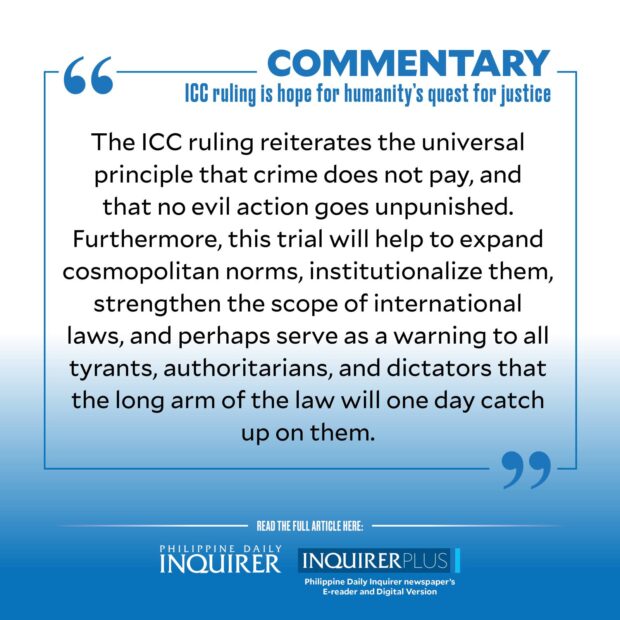ICC ruling is hope for humanity’s quest for justice

The appeals judges of the International Criminal Court (ICC) have cleared the way for an investigation into thousands of killings during the Philippines’ “war on drugs,” a ruling that Bryony Lau, deputy Asia director at Human Rights Watch, said “marks the next step toward justice for victims of ‘drug war’ killings and their families … “ I concur with Lau.
Though the Philippine government may challenge in the future the narrow 3-2 majority vote by the ICC’s appeals chamber, it is my view that the manner of voting and the democratic process of the entire proceedings are enough to convince people that justice and fairness are truly being practiced.
Article continues after this advertisementQuestion of jurisdiction. International Center for Transitional Justice senior expert Ruben Carranza is correct in his contention: Once the question of jurisdiction is raised by the parties, “the court will have to determine with more clarity what it means for a state party to withdraw and when their obligation to cooperate ends …” But such a move could jeopardize the suspects’ own case, he warned. “[They] also face the risk that, if their challenge is denied, then they have to resign [themselves] to the fact that if they appeared before the court, then they ought to continue appearing.” (“No trial, arrest in sight yet despite ICC ruling,” News, 7/20/23).
The contention by former president Rodrigo Duterte and his cohorts that the ICC no longer has jurisdiction over his person because the country had already withdrawn from the tribunal is incontestably impertinent, as it violates the doctrine of pacta sunt servanda.
This is an international rule which means that agreements and treaties agreed to by nations must be observed in good faith. Further, such irresponsible pronouncement is a violation of the Constitution, specifically Article II, Section 2 which expressly provides that: “The Philippines renounces war as an instrument of national policy, adopts the generally accepted principles of international law as part of the law of the land and adheres to a policy of peace, equality, justice, freedom, cooperation, and amity with all nations.”
Article continues after this advertisementThis provision is also known as the incorporation clause, meaning, the Philippines as a member of the international community adopts the same, and they are already incorporated in our Constitution.
The ICC ruling reiterates the universal principle that crime does not pay, and that no evil action goes unpunished. Furthermore, this trial will help to expand cosmopolitan norms, institutionalize them, strengthen the scope of international laws, and perhaps serve as a warning to all tyrants, authoritarians, and dictators that the long arm of the law will one day catch up on them.
International law on crimes against humanity. Professor Robert Post in his introduction of Professor Seyla Benhabib’s book, “Another Cosmopolitanism” (2006) posted the following question: How can we fashion political and legal institutions to govern ourselves, all together, on this earth?
The fundamental challenge for our time is the construction of a jurisprudential theory able to reconcile the universality of human rights with the partiality of positive law. Argued Benhabib on crimes against humanity in her book, “The Rights of Others” (2004): “The concept of crime against humanity … stipulates that there are certain norms in accordance with which state officials as well as private individuals are to treat one another, even, and precisely, under conditions of extreme hostility and war. Ethnic cleansing, mass executions, rape, and cruel and unusual punishment of the enemy, such as dismemberment, which occur under conditions of a ‘widespread or systematic attack,’ are proscribed, and all can constitute sufficient grounds for the indictment and prosecution of individuals who are responsible for these actions, even if they are or were state officials, or subordinates who acted under orders.
The refrain of the soldier and the bureaucrat—’I was only doing my duty’—is no longer an acceptable ground for abrogating the rights of humanity in the person of the other—even when, and especially when, the other is your enemy.”
The ultimate aim of the ICC ruling is to seek justice. The perpetrators have to pay. In the impassioned words of French socialist writer, Émile Zola: “I have but one passion: to enlighten those who have been kept in the dark, in the name of humanity which has suffered so much and is entitled to happiness. My fiery protest is simply the cry of my very soul.”
Jose Mario D. De Vega is assistant professor at the Department of Philosophy and Humanities in the College of Arts, Education and Sciences at the National University of the Philippines.
















